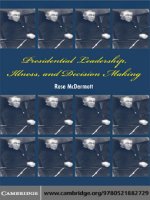0521833183 cambridge university press brute rationality normativity and human action sep 2004
Bạn đang xem bản rút gọn của tài liệu. Xem và tải ngay bản đầy đủ của tài liệu tại đây (1.09 MB, 246 trang )
This page intentionally left blank
Brute Rationality
Normativity and Human Action
This book presents a new account of normative practical reasons and
the way in which they contribute to the rationality of action. Rather
than simply ‘counting in favor of ’ actions, normative reasons play
two logically distinct roles: requiring action and justifying action.
The distinction between these two roles explains why some reasons
do not seem relevant to the rational status of an action unless the
agent cares about them, while other reasons retain all their force
regardless of the agent’s attitude. It also explains why the class of
rationally permissible action is wide enough to contain not only all
morally required action, but also much selfish and immoral action.
The book will appeal to a range of readers interested in practical
reason in particular, and moral theory more generally.
Joshua Gert is Assistant Professor at the Department of Philosophy,
Florida State University. He has published in a number of philosophical journals including American Philosophical Quarterly, Ethics,
and Noˆus.
CAMBRIDGE STUDIES IN PHILOSOPHY
General editors e. j. lowe and walter sinnott-armstrong
Advisory editors
jonathan dancy University of Reading
john haldane University of St Andrews
gilbert harman Princeton University
frank jackson Australian National University
william g. lycan University of North Carolina, Chapel Hill
sydney shoemaker Cornell University
judith j. thomson Massachusetts Institute of Technology
recent titles
joshua hoffman & gary s. rosenkrantz Substance among other categories
paul helm Belief policies
noah lemos Intrinsic value
lynne rudder baker Explaining attitudes
henry s. richardson Practical reasoning about final ends
robert a. wilson Cartesian psychology and physical minds
barry maund Colours
michael devitt Coming to our senses
sydney shoemaker The first-person perspective and other essays
michael stocker Valuing emotions
arda denkel Object and property
e. j. lowe Subjects of experience
norton nelkin Consciousness and the origins of thought
pierre jacob What minds can do
andre gallois The world without, the mind within
d. m. armstrong A world of states of affairs
david cockburn Other times
mark lance & john o’leary-hawthorne The grammar of meaning
annette barnes Seeing through self-deception
david lewis Papers in metaphysics and epistemology
michael bratman Faces of intention
david lewis Papers in ethics and social philosophy
mark rowlands The body in mind: understanding cognitive processes
logi gunnarsson Making moral sense: beyond Habermas and Gauthier
bennett w. helm Emotional reason: deliberation, motivation, and the nature of value
richard joyce The myth of morality
ishtiyaque haji Deontic morality and control
andrew newman The correspondence theory of truth
jane heal Mind, reason, and imagination
peter railton Facts, values and norms
christopher s. hill Thought and world
wayne davis Meaning, expression and thought
andrew melnyk A physicalist manifesto
jonathan l. kvanvig The value of knowledge and the pursuit of understanding
william robinson Understanding phenomenal consciousness
michael smith Ethics and the a priori
d. m. armstrong Truth and truthmakers
Brute Rationality
Normativity and Human Action
Joshua Gert
Florida State University
cambridge university press
Cambridge, New York, Melbourne, Madrid, Cape Town, Singapore, São Paulo
Cambridge University Press
The Edinburgh Building, Cambridge cb2 2ru, UK
Published in the United States of America by Cambridge University Press, New York
www.cambridge.org
Information on this title: www.cambridge.org/9780521833189
© Joshua Gert 2004
This publication is in copyright. Subject to statutory exception and to the provision of
relevant collective licensing agreements, no reproduction of any part may take place
without the written permission of Cambridge University Press.
First published in print format 2004
isbn-13
isbn-10
978-0-511-21121-8 eBook (EBL)
0-511-21298-4 eBook (EBL)
isbn-13
isbn-10
978-0-521-83318-9 hardback
0-521-83318-3 hardback
Cambridge University Press has no responsibility for the persistence or accuracy of urls
for external or third-party internet websites referred to in this publication, and does not
guarantee that any content on such websites is, or will remain, accurate or appropriate.
To my parents, my sister Heather,
and my wife Victoria
Contents
Preface and acknowledgements
page xi
1
What would an adequate theory of rationality be like?
1
2
Practical rationality, morality, and purely justificatory reasons
19
3
The criticism from internalism about practical reasons
40
4 A functional role analysis of reasons
62
5
Accounting for our actual normative judgments
85
6
Fitting the view into the contemporary debate
111
7 Two concepts of rationality
136
8 Internalism and different kinds of reasons
167
9
186
Brute rationality
References
Index
221
226
ix
Preface and acknowledgements
I would guess that the first time I read any real philosophy was when I was
about ten years old. Sitting and reading aloud on the living room couch
with my father, I took the part of Hylas in Berkeley’s Three Dialogues. It
is a happy memory for me, despite the fact that I turned out, as those
familiar with that dialogue will know, not to have very many lines, and
always to be wrong. I also have a very distinct visual memory, from roughly
the same period, of the moment my father presented the open question
argument to me. He didn’t explain the problems with the argument, and
if he had, I doubt I would have understood what he was saying. I was just
sophisticated enough that the argument seemed to me to show exactly
what Moore thought it showed. I didn’t like having to believe in nonnatural properties. I didn’t even have any clear idea what they were. But I
had to do it. Twenty-seven years later, I think I might have gotten out of
the problem.
Those two memories may be the oldest ones I have of doing any philosophy with my father, but they are by no means the only ones. Later memories are less distinct, probably because philosophical discussion became as
common as eating dinner. But as far as I can recall, all of these memories
of talking philosophy with my father – of arguing and criticizing, and,
generally, of being shown that I didn’t know what I was talking about –
are uniformly happy. My love for philosophy is, I am sure, continuous
with my great love for my father. There is no doubt that it is my father
who has had the most profound philosophical impact on me. Indeed, I
am pleased to think of myself, in many parts of this book, as refining,
building upon, and modifying his views, just as other philosophers have
refined, built upon, and modified the views of their advisors. Given that
my father’s influence began early, I cannot adequately express how lucky I
feel that so many of his starting points have turned out to be so fruitful. For
it is hard to deny that the students of Kantians tend to become Kantians,
and the students of Humeans tend to become Humeans. When I consider
xi
Preface and acknowledgements
the strength of this law of philosophical inheritance, and realize how easily
I might have fallen under the spell of a mainstream view (or, worse, a
currently fashionable one), I am reminded of the huge role fortune plays
in all the achievements for which we would like to take exclusive credit.
Other than my father, I would like to thank a number of people with
whom I have had profitable conversations or correspondence on the topics I address in the following chapters. I should single out Daniel Callcut,
Charles Chastain, and John Deigh, both for the sheer volume of conversation, and also for entering into the discussion with sufficient sympathy to understand the whole picture. Thanks also to Peter Achinstein,
Ken Akiba, Robert Audi, John Broome, Mar´ıa Victoria Costa, Jonathan
Dancy, Heather Gert, Peter Hylton, Anthony Laden, Paul McNamara,
Al Mele, Andrew Melnyk, Karen Neander, Brian Neuslein, Joseph Raz,
Thomas Scanlon, Jerome Schneewind, Paul Weirich, and Susan Wolf.
I also owe a great debt to Oscar Jorge Mainoldi, who accidentally taught
me Spanish, and who superintended the writing of virtually the whole
of this book during five successive summers at what must be the world’s
most fertile environment for the production of philosophy: the bar/caf´e
“Portofino,” at the corner of 13th and 42nd, in La Plata, Argentina. For
being among the truthmakers behind this fact, thanks also to Daniela
“Pichu” Memna, Mercedes Mirabella, Mart´ın Zamudio, Rub´en Peralta,
and Sebasti´an Alvarez.
Chapter 1 takes the form it does largely because I was invited to give
an overview of my account of reasons and rationality at the Universidad
Nacional de La Plata in La Plata, Argentina, in the summer of 2002. I am
very grateful to Pedro Karczmarczyk and Mart´ın Daguerre for organizing
that talk, and I am grateful to all the members of that audience for their
patience with my Spanish. The material for chapter 2 was previously published as “Practical Rationality, Morality, and Purely Justificatory Reasons”
in American Philosophical Quarterly 37 (3), 227–43. I am grateful to the Executive Editor of APQ, Nicholas Rescher, for permission to use that material
here. Most of the material for chapters 3 and 7 was previously published in
the Southern Journal of Philosophy as “Skepticism about Practical Reasons
Internalism” 39 (1), 59–77 and “Two Concepts of Rationality” 41 (3),
367–98, and some material for chapter 3 was also taken from “Korsgaard’s
Private-Reasons Argument” Philosophy and Phenomenological Research 64
(2), 303–24. I thank the Editor of the Southern Journal, Nancy Simco,
and the editors of PPR for permission to use that material here.
Chapter 4 appears as “A Functional Role Analysis of Reasons” in
xii
Preface and acknowledgements
Philosophical Studies (2004). A version of chapter 5 was published as
“Requiring and Justifying: Two Dimensions of Normative Strength”
Erkenntnis 59 (1), 5–36, and appears here with kind permission of Kluwer
Academic Publishers. A distant ancestor of chapter 7 was published, in
Spanish, in Revista Latinoamericana de Filosof´ıa 25 (2), 255–81, after having
been presented to the members of the Centro de Investigaciones Filos´oficas
in Buenos Aires, Argentina, in 1998. I am grateful to Mar´ıa Julia Bertomeu
for her invitation to address this group. Chapter 8 first appeared in The
Philosophical Forum 34 (1), 53–72, and chapter 9 appeared in Noˆus 37 (3),
417–46. I acknowledge the kind permission of Blackwell Publishing to
reprint both of them here.
Finally, I should thank Florida State University for summer funding
provided through their FYAP Summer Grant program. It was during the
summer in which I received this funding that I was able to revise the
manuscript to deal – I cannot say how successfully – with the comments
of Russ Shafer-Landau and Michael Ridge, who reviewed the original
manuscript for Cambridge University Press. My final thanks go to them
for their sympathetic and open-minded attitude, and for many useful criticisms.
xiii
1
What would an adequate theory of
rationality be like?
th e f undam e ntal normat ive not i on
When we argue with other people about what to do, very often we appeal
to principles. Certainly when philosophers offer moral theories, and argue
that we should be moral, they appeal to principles. And even when we,
or they, offer reasons in place of principles, it is reasonable to think of
such arguments as shorthand for appeals to principles. For no one would
advocate an action simply because there was some reason in its favor, if it
were clear that there were compelling reasons against performing it. Thus
when reasons are cited in arguments, there is some idea that all the relevant
reasons, taken together, support the action. This implies that there is some
principle in the background that produces overall verdicts based on all those
reasons: perhaps it is the simple principle ‘perform the action supported by
the most reasons’, or perhaps it is some more complicated principle. One
cites particular reasons in order to suggest that those reasons are sufficient
to determine the outcome of the application of such a principle. The very
plausible idea that two actions to which the same reasons are relevant must
have the same rational status also suggests that reason-based arguments are
backed by a unique principle: a principle that takes those reasons as input
and yields the status of the action as output.
When a principle is made explicit in an argument, it is often appropriate to ask ‘Why should I follow that principle?’ And when an answer
is given, in terms of some other principle, it is often appropriate to ask
exactly the same question. In some cases there will be no good answer to
this question, and then the recommendations that flow from the principle may lose their authority. There is, however, a significant philosophical
tradition according to which this sequence of principles and questions,
and more basic principles and further questions, cannot go on forever.
At some point, after the articulation of one of these principles, it will no
longer make sense, or be appropriate, to ask ‘But why should I follow
1
Brute Rationality
that principle?’ That is, there is a philosophical tradition that asserts the
existence of a fundamental normative principle applicable to action. Perhaps this
tradition goes back as far as Aristotle, who asserted that there was one governing end according to which all human action was to be judged. Hume,
when he argued that reason cannot by itself direct the will, was reacting
against the majority opinion of his contemporaries, according to whom
reason could do so. That is, the philosophers against whom Hume was
arguing held that if it could be shown that reason required or prohibited
an action, that was the end of the practical argument about that action: no
further appeal could possibly be made that could legitimately alter such
a judgment. Kant also is a prominent member of this tradition, advocating the existence of a categorical imperative that tells one how one must
act, and against which no further consideration can have any legitimate
force.
Contemporary philosophers also defend the existence of a fundamental normative principle, or set of principles. Indeed, this is the sense of
‘rational’ that is central to contemporary ethical theorizing. For example,
Stephen Darwall writes that “It is part of the very idea of the [rationally
normative system] that its norms are finally authoritative in settling questions
of what to do.” Thomas Nagel writes that it should not be possible to ask
why one should do what one has reason to do, and that for this reason
there cannot be a justification for acting rationally. And Allan Gibbard’s
notion of rationality “settles what to do . . . what to believe, and . . .
how to feel.”1 According to all of these philosophers it is a conceptual
truth that there cannot be a sufficient reason to act irrationally and that
there is a reason not to do so. Therefore, according to these philosophers,
the question ‘Could I have a sufficient reason to do an irrational act?’ is
as misguided (or trivial) as the question ‘Could there be an unmarried
bachelor?’
When we are presented with any proposal regarding this fundamental
normative principle, there are two tests we can apply to see whether
it is adequate. The first is to see whether the question ‘Why should I
always follow that principle?’ makes clear sense. If it does make sense,
this casts the fundamental nature of the principle into doubt. For the
1
Darwall (1983), pp. 215–16; Nagel (1970), pp. 1–9; Gibbard (1990), esp. p. 49. See also
Korsgaard (1996a), p. 104 and Smith (1994), pp. 150ff. Smith claims that it is all and only
reasons which spring from the norms of rationality that make actions desirable. Of course
there are other conceptions of rationality. Robert Nozick (1993), pp. 40, 117 is concerned
with the human faculty of rationality, and is content to ask about its purpose or function.
2
Conditions on an adequate theory
principle is supposed to the most basic – the principle that stands behind
all others. If the above question makes sense, then the putative fundamental
principle certainly is not wearing its fundamental nature on its face. That
is, it does not appear to be the end of the normative road. The second
test is to see whether one could ever sensibly offer reasons for acting
against the principle. If this is a real possibility then the principle cannot
be the fundamental principle that tells us how we ought always to act.
To illustrate these tests, it may be useful to use them to disqualify one
possible fundamental normative principle: always act so as to maximize
the satisfaction of your preferences.2 Does it make sense to ask ‘But why
should I always act so as to maximize the satisfaction of my preferences?’
Yes, it does. For one could elaborate the question in this way: ‘Why should
I always act so as to maximize the satisfaction of my preferences, if I know
my preferences are the result of a brain defect that tends to produce selfdestructive preferences?’3 This failure to pass the first test is related to the
way in which the proposed principle will also fail the second test. For one
way of sensibly offering a reason to act against the principle is to say ‘But
if you follow this principle you will cause yourself a lot of pain, without
any benefit.’
The second of the above tests is quite clearly one which a fundamental
normative notion must pass. If there can be an adequate reason to act
against a principle, that principle cannot be telling us how we ought
always to be acting. The first test, however, is more slippery, and it may
be useful to show how a principle may pass it without at first seeming to
do so. Consider then the following:
One should never perform an action that will harm oneself unless it will bring
some compensating benefit to someone (perhaps oneself). All other actions are
rationally permitted.
It seems obvious that one could sensibly ask ‘Why should I always follow
this principle?’ One reason it seems obvious is that there seems to be
an answer. For example, one might offer ‘Because then one will avoid
2
3
It is unclear if any contemporary philosophers hold such a simple version of this view. But
the criticisms offered here also tell against more sophisticated versions of such principles.
For a very clear presentation of these criticisms see Ripstein (2001).
This is not the place to descend into arguments about the various ways in which one might
patch up the suggested principle. But it is worth mentioning that the strategy of ruling
out desires that are the result of, say, a brain defect, is not a simple one. For we use the
notion of rational action in determining what counts as a brain defect, rather than (say) a
statistically rare configuration of neurons.
3
Brute Rationality
suffering harms.’ But in fact that is not an answer, since it is false that if
one successfully follows this principle, one will necessarily avoid suffering
harms. This is because the principle permits one to suffer harms in cases in
which one will thereby produce compensating benefits for someone else.
One might then suggest the following amended answer: ‘Because one will
avoid suffering harms, except in cases in which one will thereby produce
compensating benefits for someone.’ What is important to see is that with
this amended answer one has ceased to offer a further reason to obey the
principle. One has simply pointed out that by following the principle one
follows the principle. Of course, this brief discussion has not shown that
the above principle actually does pass the first test. It only shows one way
in which a principle may misleadingly appear to fail it. Moreover, though
the above principle may in fact pass this one particular test, it may be
inadequate for other reasons.
This book is part of the tradition that seeks to discover and defend a
fundamental normative principle applicable to action – of course by some
means other than the production of a still more fundamental principle.
That is, it seeks to provide an account of a principle that passes both of
the tests mentioned above. It is devoted entirely to this principle, and not
to its employment in arguing for further normative claims. In particular,
no moral view is advocated, although it will be clear that the account has
significant implications for the development of moral views.
In the phrase ‘fundamental normative principle,’ the word ‘fundamental’ should not be taken to mean ‘most important.’ For there are many
other normative principles that, in different contexts, are likely to be
more important and more salient than the principle that is the central
topic of this book. Of course, we should never follow these more salient
principles if they can be shown to violate the fundamental one: that is
part of what it means for it to be fundamental. Another part of what it
means is that if it is clear that an action does not violate the fundamental
principle then there may be nothing we can say to dissuade even a rational agent from performing it – the agent may remain perfectly rational
in resisting all our arguments. As will become clear later in the book,
this means that the fundamental normative principle gives agents a very
wide scope in making decisions about how to act. Because of the lack
of guidance that the principle provides, some may be tempted to think
that it cannot really be fundamental. But that is to confuse being fundamental with being most generally useful, or with being salient. It will turn
out that, because we almost always act rationally without having to think
4
Conditions on an adequate theory
about it, the fundamental normative principle will very rarely be of much
use in particular decisions. It will not tell us, for example, which career to
choose, or whether to marry, or to have children, or whether to pursue
wealth over enlightenment. As I will argue in various ways in what follows, it will not even tell us whether to take the high moral road, or the
low. These questions we must answer for ourselves – they are choices, and
it is futile to search for a basic principle that will authoritatively hand us
the correct answer. In a limited number of cases I have found that when
people are tempted to act against the fundamental normative principle,
it is sometimes effective simply to point this out. This tends to bring the
real source of the temptation into clearer focus, which helps in resisting it.
But the primary usefulness of a clear view of the fundamental normative
principle is not – at least directly – practical. Rather, it is theoretical: the
principle will figure in an explanation of what it is for an action to be
rational, in a sense that is closely connected with mental functioning. This
notion, in turn, is often indispensable in restricting the scope of ‘everyone’ as it is used in philosophical theories (such as contractualism). The
principle will also play a role in explaining why we should want to be
rational, in that sense. And of course the fundamental principle will have
many indirect practical implications, for very often such a principle plays
an obvious and central role in the development of moral theory. And a
moral theory, if it is clear, may have significant practical implications for
people who care about morality.
rat i onal i ty and m e ntal f unc t i on i ng
It seems fairly clear that whatever the fundamental normative notion might
be, it will use the facts about one’s situation in yielding its judgments. This
is why, when we are trying to decide how to act, we do not simply rest
content with our present beliefs or evidence about the consequences of
our actions, but seek out additional relevant information. Seeking this
information is part of the process of figuring out what to do. Sometimes,
through no fault of our own, we may fail to get the correct information,
or may form justified, but false, beliefs. Because of this we may often fail
to discover what we ought to do, and consequently we may fail to do what
we ought to do. In failing to act according to the fundamental normative
principle in such cases, we are not to be blamed. Nothing has gone wrong
in the mental processes that produced our action. We would not want to
call such actions ‘irrational,’ if we were taking irrational action to count
5
Brute Rationality
against the rationality of the agent in a way that was relevant to questions of
moral responsibility, competence to give consent, freedom of will, mental
health, and so on. Similarly, we may sometimes perform an action that
is permitted according to the fundamental normative principle, given the
facts; however, given our beliefs, it may be that our performance is obviously
the result of some mental malfunction. In such cases we may want to call
the action ‘irrational,’ if we are concerned with these same questions of
moral responsibility, competence, and so on.
Since there may often be adequate (but unknown) reasons to perform
actions that would be irrational in this ‘mental functioning’ sense, it should
be clear that the ‘mental functioning’ sense of rationality is not the fundamental normative sense. It fails the second test. Nevertheless, it should
be equally clear that the two senses of rationality are very closely related.
But there is an interesting puzzle that one encounters in trying to specify
exactly how they are related. It is very tempting to think that the ‘mental functioning’ sense of rationality is nothing but the fundamental sense,
relativized to the beliefs of the agent, in place of the facts of the case.4 But
this cannot be correct. For it may be that an action would be rational, in
the fundamental sense, if the world were as my beliefs represent it, and yet
it may still be that my performance of the action would be irrational in
the ‘mental functioning’ sense. This may happen because I conspicuously
lack a belief that I should definitely have: the belief that my action will
cause me a great deal of suffering, for example. I may refuse to believe
this, although I have more than enough evidence to believe it, because
it may be that the suffering will be caused by someone I love, and I may
deceive myself into thinking that the person would never hurt me. In such
a case my action would be rational, in the fundamental sense, if my beliefs
accurately represented the world. But it is nevertheless irrational in the
‘mental functioning’ sense. The next obvious strategy would be to define
rationality in the ‘mental functioning’ sense in the following way: it is
simply the same as the fundamental sense, but relativized to the beliefs that
the agent should have, given the available evidence.5 But this strategy also
fails, perhaps even more spectacularly. For it may be that an action would
be rational, in the fundamental sense, if the world were as I should believe
it to be, and yet it may still be that my performance of the action would
4
5
See Brandt (1979), pp. 72–73; Gibbard (1990), pp. 18–19; Harman (1982), p. 127; Raz
(1999a), p. 22.
This definition follows a pattern used by Rawls in defining what he calls ‘subjective
rationality’ in relation to what he calls ‘objective rationality’. See Rawls (1971), p. 417.
6
Conditions on an adequate theory
be irrational in the ‘mental functioning’ sense. How could this happen?
It may be that, though I should believe that a certain unpleasant action
will benefit me greatly in the long term, I do not actually believe it. In
such a case, the fact that the action will benefit me (and that I should
believe this) does nothing to mitigate the irrationality of performing it, if
it would be irrational to do so in the absence of the future benefits. So
two initially plausible accounts of the relation between the two senses of
rationality are completely inadequate. And it is obvious that one cannot
simply relativize to the set of beliefs that one does or should have, for this
will typically be a set of inconsistent beliefs. Nor can one relativize to the
beliefs one does and should have, for if one believes that a certain action
will be quite painful, and will benefit no one, then it would be irrational
to perform the action, even if one should not have this belief.6 This book
provides an account of the relation between the ‘mental functioning’ and
‘fundamental’ senses of rationality in a way that not only avoids counterexamples, but also explains why the above relativizing definitions fail,
and why they fail in the particular ways they do.
The ‘mental functioning’ and ‘fundamental’ senses of rationality are
often distinguished by calling the former ‘subjective rationality’ and the
latter ‘objective rationality,’ and this is the terminology I will use in this
book.7 But quite often philosophers do not distinguish the two senses at
all. And sometimes the fundamental sense is the only sense of rationality that is officially recognized, so that the phenomena captured by the
‘mental functioning’ sense end up being described with phrases such as
‘rational, relative to the beliefs of the agent.’8 In earlier writing I sometimes borrowed a piece of terminology from Allan Gibbard, who uses the
term “advisable” as a label for “[w]hat it makes sense to do objectively,
in light of all the facts” – that is, for what I am calling ‘objectively rational’ action.9 Gibbard’s terminology has the advantage of minimizing the
risk of thinking that the objective notion has much to do with mental
functioning directly. However, I now prefer the terms ‘subjective rationality’ and ‘objective rationality’ because, despite the fact that a perfectly
(subjectively) rational person might often perform objectively irrational
actions, it is uncontroversial that there is a very close connection between
subjective and objective rationality. Using the two terms ‘rationality’ and
‘advisability’ wrongly lends an air of plausibility to objections that depend
6
7
8
See Cullity and Gaut (1997), p. 2.
See Rawls (1971), p. 417; compare Gibbard (1990), p. 89.
9 Gibbard (1990), p. 89.
Williams (1981), p. 103. See also Sobel (2001).
7
Brute Rationality
on the false premise that a fully informed agent, performing a rational
action, might nevertheless be performing an inadvisable one. Also, the
‘subjective/objective’ terminology allows me to use phrases such as ‘an
account of rationality’ in order to indicate an account both of subjective
and objective rationality, and of the relation between the two. In what
follows, when I use the words ‘rational’ or ‘irrational’ without any qualification, they should be understood in the subjective sense, which fits more
with the everyday understanding of these words.
Although I will not provide a full account of the relation between subjective and objective rationality until chapter 7, some limited claims about
their relation are independently plausible, and will be very useful in a
number of earlier arguments. First, if an agent knows all the facts relevant
to his action, then if that action is objectively irrational – that is, if it is
prohibited by the fundamental normative principle – it is also subjectively
irrational. This connection will allow us to move from the objective irrationality of an action to its subjective irrationality (and therefore from its
subjective rationality to its objective rationality) in all cases in which it is
permissible to stipulate that the agent has all relevant beliefs. This claim is
very similar to one of Gibbard’s: “in the special case in which I know all
that bears on my choice, what is rational for me to do is what is advisable
for me to do.”10 My claim is slightly weaker, however, for it does not
entail that we can always move from objective rationality – what Gibbard
calls ‘advisability’ – to subjective rationality (or, therefore, from subjective irrationality to objective irrationality) even in the case in which the
agent is fully informed. As chapters 7 and 8 will explain, this move can
be illegitimate when the agent does not care about the considerations that
make his action objectively rational, or only performs that action because
of failures of instrumental rationality: cases in which an agent does ‘the
right thing for the wrong reasons.’ These are cases in which the etiology
of the action is what makes it subjectively irrational, and this gives rise
to the possibility that if the same action had been done for other reasons
it would have been subjectively rational – and therefore it also gives rise
to the possibility that an action can be objectively rational despite being
subjectively irrational, even in a fully informed agent. Acknowledging this
possibility, we can make the following claim: if the agent is fully informed,
then if his action would have been subjectively irrational no matter what its
etiology, it is also objectively irrational. Since, as has already been noted, if
10
Gibbard (1990), p. 19.
8
Conditions on an adequate theory
the action of a fully informed agent is objectively irrational then it is also
subjectively irrational, Gibbard’s claim is very close to correct.11
Another interesting feature of subjective rationality is the following. It
seems that if one is simply unmoved by awareness of the prospect of some
significant harm for oneself – say, that one’s action will cause one a great
deal of pain, or will risk some nontrivial injury – this does nothing to
the normative force of the reason that one is aware of. This is not to
deny that one can be perfectly rational in willingly suffering such harms,
if there are sufficient countervailing reasons. But the fact that one needs
significant countervailing reasons shows that a rational person cannot be
very indifferent to such harms for himself. On the other hand, relative
indifference to the harms that one’s actions may cause other people is not
nearly as universally regarded as irrational in the ‘mental functioning’ sense
that is relevant to questions of moral responsibility and so on. Rather, when
we speak of such indifference, we use words such as ‘callous,’ ‘selfish,’ or
‘mean.’ No one denies that it is rationally permissible to be motivated by
other-regarding reasons. But it does not seem to be rationally required
to the same extent that it is rationally required that one avoid harms for
oneself. Of course there are views of rationality according to which one
is in fact required to be as strongly motivated by altruistic as by selfinterested reasons. This introductory chapter is not the place to combat
such views. Rather, it is the place to mention that such accounts need to
make us comfortable with some apparently counterintuitive judgments as
to whether certain actions are subjectively rational or not – rational in the
sense that is relevant to questions of moral responsibility and so on. That
11
It may be worth mentioning at the outset that subjective rationality, as understood here,
is not to be confused with Thomas Scanlon’s technical and restricted sense of rationality,
according to which actions are rational or irrational depending solely on whether or not
they are in line with the agent’s normative judgment that he or she ought to perform the
action. Scanlon’s sense is inadequate if we want a general notion that captures the wide
range of failures of practical mental functioning that are relevant to questions of mental
illness, competence to give consent, moral responsibility, and so on. One reason for its
inadequacy as such a general notion is that, as I argue in chapter 9, our actions very rarely
involve the normative judgments that are presupposed when one calls an action rational
or irrational in Scanlon’s sense. This is not to criticize Scanlon’s choice of terminology.
One is free to use whatever terminology one wants, as long as one is clear about what
one means. It is only a reminder that Scanlon himself recognizes many other failures in
practical mental functioning: insensitivity to certain reasons, compulsions, and phobias,
even when they are accompanied by rationalizing normative judgments (or no normative
judgments), etc. It is to this more general class that I am applying the term ‘subjectively
irrational.’ Of course, acting against one’s considered judgment as to how one ought to
act is one species of the sort of irrationality with which this book is concerned, and it will
be captured by the account offered in chapter 7.
9









